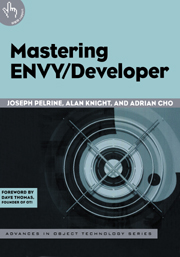Book contents
- Frontmatter
- Contents
- Foreword
- Acknowledgments
- Introduction
- Chapter 1 Getting Started
- Chapter 2 Basic Concepts
- Chapter 3 Team Development
- Chapter 4 Advanced Development
- Chapter 5 Formal Concepts
- Chapter 6 Packaging and Delivery
- Chapter 7 Extending the System
- Chapter 8 Administration
- Chapter 9 Goodies
- Chapter 10 Troubleshooting
- Appendix: A Selected Annotated API of ENVY System Classes
- Glossary
- References
- Index
Chapter 1 - Getting Started
Published online by Cambridge University Press: 11 January 2010
- Frontmatter
- Contents
- Foreword
- Acknowledgments
- Introduction
- Chapter 1 Getting Started
- Chapter 2 Basic Concepts
- Chapter 3 Team Development
- Chapter 4 Advanced Development
- Chapter 5 Formal Concepts
- Chapter 6 Packaging and Delivery
- Chapter 7 Extending the System
- Chapter 8 Administration
- Chapter 9 Goodies
- Chapter 10 Troubleshooting
- Appendix: A Selected Annotated API of ENVY System Classes
- Glossary
- References
- Index
Summary
To start with, we'll introduce ENVY/Developer, go over enough of the basic ENVY/Developer architecture to get you started, and describe in some detail how to set up the environment and configure the options available. All readers will want to review the architecture section. The setup sections will be of particular interest to new users and to administrators responsible for the maintenance of an ENVY installation.
Overview
First, let's identify what ENVY/Developer is, where it comes from, and what it's good for. This information will help you understand the architecture and where ENVY's concepts come from.
What Is ENVY/Developer?
ENVY/Developer is a software engineering environment for Smalltalk programming. Specifically, it provides facilities for team programming and delivering significant-sized applications, built on top of the regular Smalltalk development environment. Smalltalk is widely recognized as being very productive for individual developers, but the standard Smalltalk environment was not designed with the idea of collaborative development in mind. ENVY/Developer extends the basic Smalltalk environment to include facilities for team programming and configuration management.
Technically, ENVY is a generic term that refers to a family of products and technologies. These include ENVY/Smalltalk, ENVY/Developer, ENVY/Replicator, and others. However, ENVY/Developer is the most widely used of these products, and it is common usage to use just the term “ENVY” to refer to ENVY/Developer, or even more specifically to ENVY/Manager. Although this is technically incorrect, it is the common usage and is the standard we follow for this book.
- Type
- Chapter
- Information
- Mastering ENVY/Developer , pp. 1 - 20Publisher: Cambridge University PressPrint publication year: 2001



